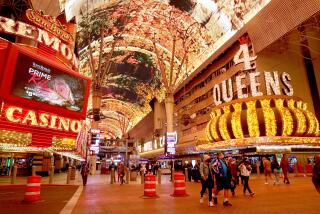For Atlantic City, Casino Jackpot’s Still a Long Shot
- Share via
ATLANTIC CITY, N.J. — After 38 years watching the boardwalk from a worn Persian carpet in “Madame Edith’s Temple of Knowledge,” Edith Stevens says she doesn’t need her crystal ball or Tarot cards to read this city’s future.
“There has to be changes here,” she said, gold bracelets jangling on each arm. “This town can’t get any worse.”
With the dramatic arrests last month of Mayor James L. Usry and 13 political associates on charges of bribery and corruption, one need not be psychic to see fortunes are fading for this famed seaside resort. Eleven years after the first casino opened, gambling has yet to pay off for Atlantic City.
Although the city is the nation’s top tourist draw--33.1 million visitors came last year--seven of the 12 casinos lost money and one, the Atlantis, closed its doors forever. Casino revenues so far this year are flat. “I expect next year will be a disaster,” said market analyst Marvin B. Roffman. “There probably will be a couple of casinos that will go under.”
Behind the casinos, the city is increasingly poor and black. There is still no movie theater or major supermarket. Population has plummeted. Violent crime has tripled. Public assistance rolls have doubled. Block after block still looks bombed out, with dilapidated row houses and boarded-up stores. Money magazine ranks it as the most unlivable city in America.
“You have the ultimate in glitz and luxury in one small part of the city, and abject poverty everywhere else,” said Albert A. Marks Jr., a civic leader and longtime director of the Miss America Pageant.
Despite a decade of planning, a new convention center remains unbuilt. The “Atlantic City International Airport” has one dingy terminal and one commercial airline. And relations are so strained between city officials and the casinos that Thomas D. Carver, president of the Casino Assn. of New Jersey, the industry’s chief trade group, likens it to war.
“We are like the British Army in Belfast,” said Carver. “We are not part of this community. We are like an occupying force.”
Worse, by all accounts, this city of 36,000 is so racially polarized that many casino executives, community leaders and state officials say they are helpless to act. Casinos, which pay 62% of the city’s $110-million budget, are controlled mostly by whites. City Hall, which spends the money, is controlled mostly by blacks. The two sides rarely talk.
“There’s a bitter racial division that affects everything,” said Carl Zeitz, who left the New Jersey Casino Control Commission last December after eight years. “No matter what you say or do, no matter what your intention, it finally comes down to whether you’re black or white. It’s a sorry, sorry place.”
Racial Tension
The racial tension was clear after state police arrested Mayor Usry, City Council President Walter Collette, two city councilmen, the zoning board chairman and nine others early on July 27. Usry, 67, is the city’s first black mayor and all but one of the eight other city officials are black. Their supporters angrily insist the real conspiracy is racism, not corruption.
“We feel it’s an attempt to dismantle our black leadership,” said Wilbert Huff Royal, a community leader who organized a three-hour “Save Our Black Community Rally” at St. James A.M.E. Church last Sunday. “It was a slap at blacks in general.”
John Whittington, a former city councilman, agrees. “They can’t vote Usry out, so they’re looking for any way to get him out,” he said. “From the moment a black person assumes elected office, he immediately becomes a target.”
Usry denied the police charges in an emotional appeal to the packed pews. “I have not betrayed you, I will not betray you,” he said. Court papers allege that Usry accepted $6,000 in cash from a police informant in exchange for support for an ordinance allowing electric carts on the boardwalk.
State police deny race was a factor in the eight-month investigation. Citing more than 300 audio and video tapes, court papers allege that Albert Black, a portly private detective who worked undercover for police, paid $60,000 in bribes for zoning variances, rent control waivers, airport concessions, illegal campaign contributions and the electric cart rules. At least a dozen other arrests are likely, police said.
Sticky Problem
Whatever happens in court, political corruption is as sticky a tradition here as saltwater taffy. Back in 1910, supporters of Mayor Louis Kuehnle counted more votes than there were registered voters. His flamboyant protege, Mayor Enoch L. (Nucky) Johnson, ran rackets, brothels and gambling dens during Prohibition. He went to jail in 1941. So have three other mayors in the last two decades.
“Atlantic City was founded on corruption and speculation,” explained City Clerk Benjamin Fitzgerald. “This is nothing new here.”
Usry, a former school principal and semi-pro basketball player, was first elected mayor in 1984, vowing to end patronage, payoffs and corruption. His plea had special appeal since, prosecutors charged, then-Mayor Michael J. Matthews had sold his office to the Mafia. Matthews later pleaded guilty to taking a $10,000 bribe and was sentenced to 15 years in prison.
Gov. Thomas H. Kean proudly embraced Usry to the Republican Party. He helped bankroll Usry’s mayoral campaigns and introduced him at the 1984 Republican National Convention. Usry attended the 1988 convention as a delegate for George Bush. He was elected president of the National Conference of Black Mayors.
But back home, critics say patronage is as endemic as ever, and decisions are forever delayed. A $250,000 audit of city government in 1986 by Touche Ross & Co, paid for by the casino industry, cited case after case of over staffing, mismanagement and absenteeism. Although Usry initially agreed to the audit, most of the 150 recommendations were ignored.
Renewed Demands
The arrests prompted renewed demands for state help, either by taking over local government, appointing a trustee or just hiring a trained city manager. State Sen. William L. Gormley, who represents the Atlantic City area, said this week he would start with “a cop watching the zoning board.” So far, Gov. Kean has refused any intervention.
By now, the state had hoped for far better. Twelve years ago, Atlantic City was at the end of a long postwar slide. Once grand hotels were crumbling, unemployment soared and middle-class residents fled. The “queen by the sea” was dying.
Then, in 1977, state legislators specifically approved casino gambling to rebuild the city. The Casino Control Act called legalized gambling “a unique tool of urban redevelopment” and directed casinos to pay the bills.
But no mechanism was established to collect or spend the money. It took the state eight years to create the Casino Reinvestment Development Authority, and two more years for the agency to begin operating. In the meantime, feverish land speculation stifled development. Tax hikes of up to 600% forced older and poorer residents out of their homes. Conditions grew worse, not better.
That has begun to change, insists CRDA director Noel Eisenstat. He said the agency has now helped to build 688 rental apartments and is beginning a 10-year, half-billion-dollar project to build 3,000 new homes and apartments in the Northeast Inlet area. “It will be a totally new community in the most blighted area of the city,” he said.
Finger-Pointing
But that is in the future. For now, the finger-pointing is as fast as action on the craps tables.
Superior Court Judge Steven P. Perskie, chief sponsor of the original gambling law, defends the casinos. “By itself, gambling never could solve all the problems here,” he said. “The goal was to provide the tool by which government could work on solutions. The casinos did their job: They made money and they paid taxes. The problem in the equation is the failure of government to use the tool.”
Business leaders who popped open Champagne when the first casino opened in 1978 say they misread how the city would be affected. John R. Siracusa Jr., former head of the city’s Chamber of Commerce, thought the casinos would boost local business, bring conventions, lure investments and save the city.
“What we didn’t read right was the gambler comes into town, parks his car, goes into the casino, has dinner there, shops there, is entertained there, then calls for his car and goes home,” Siracusa said. “He leaves not one dime in the rest of Atlantic City. And the rest of the city has deteriorated.”
Not so the surrounding suburbs. More than four times as many casino workers live outside Atlantic City as within. Towns like Egg Harbor and Galloway, a short drive away, are thriving. Casino officials are quick to claim other statewide benefits: 70,000 direct and indirect jobs, $5 billion in investment, and almost $3.7 billion in federal, state and local taxes and fees, much of it dedicated to programs for the elderly and handicapped.
But analysts warn rough times are ahead. Although casinos reported revenues last year of $2.7 billion, net profits fell 80% to $14.7 million. And Donald Trump plans to open his third casino, the $1-billion Taj Mahal, next spring. The vast, onion-domed gaming hall will add 20% more tables and slots overnight to an already saturated market.
Smaller Slices
“That means the pie stays the same, but the slices get smaller,” said Al Glasgow, publisher of Atlantic City Action, an industry newsletter. “It’s going to mean survival of the fittest.”
Carver, who heads the casino association, says the city still needs an economic game plan for the future. “There is no common vision of what Atlantic City is supposed to be,” he said. “Is it going to be a year-round convention destination and resort community? Or an ugly city separate and apart from the casinos, which is what it is.”
For now, hundreds of buses clog the narrow streets, carrying low-income gamblers to the casinos. Tapped out gamblers snooze on sunny benches. At Park Place, famed from Monopoly boards, a rundown restaurant offers “All you can eat!” for $4.29. Several blocks away, children play in rubble-strewn lots. Most visitors are gone by sundown.
“Atlantic City used to be a dump,” said Roffman, an industry analyst with Janney Montgomery Scott Inc. of Philadelphia. “Now it’s a dump with casinos.”
More to Read
Sign up for Essential California
The most important California stories and recommendations in your inbox every morning.
You may occasionally receive promotional content from the Los Angeles Times.











